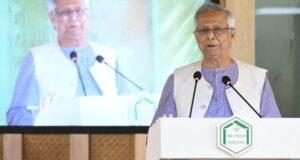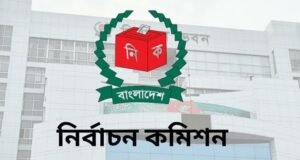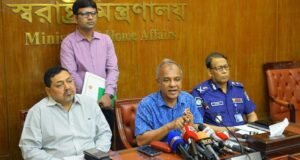
The White Paper on Bangladesh’s economy reveals extensive corruption across public and private sectors, stifling growth, with annual illicit outflows averaging USD 16 billion-over double the combined foreign aid and FDI inflows.
The findings, presented by a committee led by economist Dr Debapriya Bhattacharya, at a press conference at the NEC conference room in the capital on Sunday, exposed a grim picture of systemic fraud, mismanagement and abuse of power across multiple sectors.
Sectoral Corruption
1. Banking and Financial Sector
The banking system has been highlighted as the most corruption-ravaged sector, plagued by loan scams, illicit takeovers, and politically motivated lending.
Fraudulent practices have left distressed assets equivalent to the cost of constructing multiple large-scale infrastructure projects, such as 14 Dhaka Metro systems or 24 Padma Bridges.
Politically influenced loans and high-profile defaults have eroded trust and diverted critical funds away from productive investments.
2. Physical Infrastructure
Public infrastructure projects are riddled with inflated costs, misallocation of funds, and nepotistic appointments.
The report estimates that corruption in public projects has escalated costs by 70% on average and caused delays exceeding five years. Between $14 billion and $24 billion have been siphoned off through bribery and inflated budgets over the past 15 years, undermining the transformative potential of infrastructure investments.
3. Energy and Power
Energy contracts and power purchase agreements have reportedly been manipulated for political and financial gain. Non-competitive tendering processes and inflated project costs are prevalent, draining resources and creating inefficiencies that hinder energy supply.
4. Labour Migration
Exploitation of labour migrants through unregulated recruitment and illegal hundi transactions has diverted Tk 13.4 lakh crore in the last decade. These funds, four times the cost of Dhaka MRT Line 06, represent missed opportunities to bolster the formal economy and improve remittance inflows.
5. Social Safety Nets
The report reveals systemic inefficiencies in social protection programs, where 73% of beneficiaries are classified as non-poor, leaving millions of vulnerable individuals without support. Misallocation of funds highlights the inequities exacerbated by corruption.
6. ICT Sector
The technological novelty of the ICT sector has rendered it vulnerable to operational inefficiencies and corruption. Instances of collusive practices and inflated procurement costs are undermining its growth potential.
Magnitude of Losses
The committee provided striking figures:
Illicit Financial Outflows: Averaging USD 16 billion annually from 2009 to 2023, this is more than double the combined foreign aid and FDI inflows.
Public Investments: Up to 30% of development project funds were misappropriated, translating to a loss of Tk 1.61-2.8 lakh crore.
Distorted Supply Chains: Manipulated production and procurement have destabilised markets for key commodities, benefiting a select few while burdening consumers.
Corruption Manifestations
Key practices outlined include:
Banking Loan Scams: Misappropriation and politically influenced defaults.
Inflated and Escalated Project Costs: Systematic overestimations to siphon funds.
Land Misappropriation: Coercive acquisition practices targeting politically weak landowners.
Bribery and Nepotism: Widespread in project management and public service.
Urgent Reforms Needed
The White Paper underscores the necessity of systemic reforms to restore governance and economic resilience. Strengthening accountability mechanisms, enhancing transparency, and enforcing robust legal frameworks are critical for tackling corruption.
Government Response
The report was submitted to Chief Adviser Prof. Muhammad Yunus on Sunday, with its findings made public the following day. While the interim government had pledged to prioritise economic transparency, the scale of identified corruption presents a daunting challenge for policymakers.
Chief Adviser Prof Yunus thanked the committee for doing a landmark job, saying “This is a historic document. It will show us the economy we inherited after the July-August mass uprising. The nation will benefit from this document. “Our blood curdles to know how they plundered the economy. The sad part is they looted the economy openly. And most of us could not summon courage to confront it.”
“The problem is deeper than what we have thought,” he said, adding that the 30-chapter and 400-page long White Paper will show how crony capitalism gave birth to the Oligarchs, who controlled the policy framing.
 Weekly Bangla Mirror | Bangla Mirror, Bangladeshi news in UK, bangla mirror news
Weekly Bangla Mirror | Bangla Mirror, Bangladeshi news in UK, bangla mirror news







